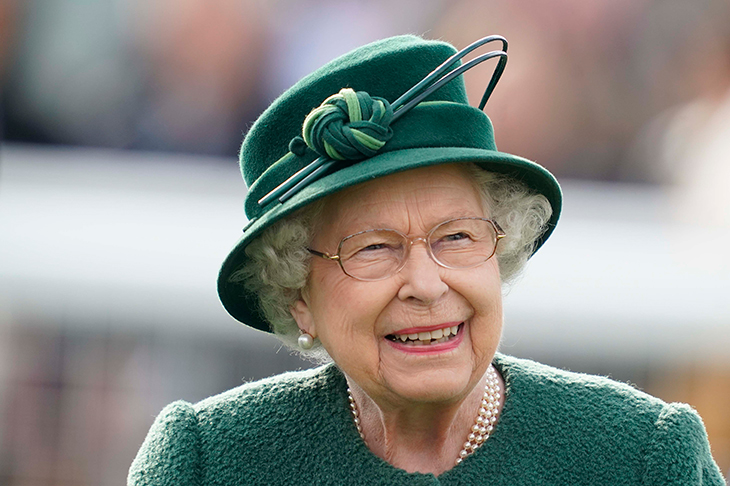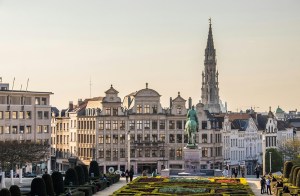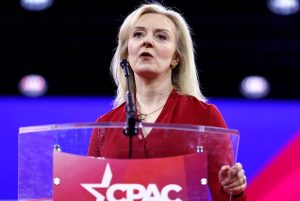Supplies of Brexit invective are now almost exhausted. While the British prime minister is denounced for denouncing Remainers as ‘collaborators’, his denouncers denounce him as a ‘tin pot dictator’ in need of a ‘rope’ and ‘lamp-post’.
Of all the bellicose hyperbole, however, it is the battle cry of ‘Stop the coup’ which is the loudest in London this week.
There are plenty of charges which can be leveled at this government. But to apply the term ‘coup d’état’ to a trio of genuflecting members of the Privy Council asking the Queen for the umpteenth prorogation of her reign is risible. For the central figure in this non-usurpation happens to be the one person in British public life who knows more about genuine coups than anyone. As head of the Commonwealth, the Queen has studied dozens of them. She has even known leaders who were ousted while sitting at her own table.
What few recall is that she has also been on the receiving end of a real coup herself. During the late 1980s, there was trouble in Fiji, then one of her realms. Fiji had become part of the British Empire (at its own request) during the reign of Queen Victoria but her great-great granddaughter had been the first monarch to go there. Visits by ‘Tui Viti’, ‘Monarch of the Fijians’, were always a hugely popular, spectacular affair, with an escort of torch-bearing warriors jogging alongside the royal convoy through Suva.
In 1987, an army officer, Colonel Rabuka, overthrew the government in back-to-back coups. Having failed to secure the endorsement of the Queen via her governor-general, he announced that he was now head of state. It all came to a head as the Queen attended the 1987 Commonwealth summit in Vancouver. In the absence of any support for outside intervention and with the situation looking increasingly precarious for her governor-general Sir Penaia Ganilau, the Queen decided he should step down for his own good.
Researching my book Queen of the World, I talked to her then private secretary Sir William Heseltine, who explained that the Queen was in an impossible position. ‘There was no point in getting the poor man to keep on going as governor-general without any local support and the Queen agreed,’ he said. With heavy heart, she told Sir Penaia — her Fijian self — to resign while Fiji was expelled from the Commonwealth. At which point came a furious intervention from the British government.
‘Mrs Thatcher thought that was an awful thing to have done,’ Sir William recalled. In the eyes of the British prime minister, this was tantamount to abdication. ‘Which it was,’ Sir William acknowledged. ‘That is a reasonable description.’
The situation in Fiji thereby led to a constitutional showdown between the Palace and Downing Street. However, the Queen stood her ground. She felt entitled to ignore the formal advice of her British government on the grounds that she was acting in her capacity as the Queen of Fiji. Margaret Thatcher eventually relented, though not before Sir William received what he called ‘a swing of the handbag’ in the process.
It is a reminder that the Queen is not a ‘puppet’ or ‘rubber stamp’, as some are trying to paint her this week. Nor, for that matter, did she simply turn her back on the Fijians. Rather, her influence played a key part in the restoration of democratic stability. It was Sir Penaia who was appointed the first president of republican Fiji, while the Queen refused to relinquish the title of ‘Tui Viti’. Similarly, Fiji has never removed the Union flag from the top left corner of its own flag or St Edward’s Crown from its uniforms. Indeed, it took another 25 years before it even removed the Queen from its banknotes and her picture still hangs in many public buildings.
As well as enduring a coup in her own backyard, the Queen has tried to stop a few elsewhere. In 1992, Valentine Strasser, a 25-year-old army officer in Sierra Leone, inadvertently became the world’s youngest head of state when he arrived at the presidential palace to seek better pay for his men and the president promptly ran away. A year later, in a Jermyn Street suit, Strasser was at the Commonwealth Summit in Cyprus facing his first audience with the Queen on board the Royal Yacht.
‘He was overcome with nerves,’ recalls Britannia’s captain Sir Robert Woodard. ‘He shook my hand and it was like a wet kipper.’ The Queen gave him some uncompromising advice. He would need to embrace democracy if he was not to be thrown out of the Commonwealth. What’s more, she was going to make sure he had some help. That evening, at her summit banquet, she sat Strasser alongside Zimbabwe’s Robert Mugabe (seen then as a champion of democracy) and asked the old pro to take the young novice under his wing. It was not a success. Strasser went on to become increasingly authoritarian before, inevitably, being ejected by a further coup in 1996 (he later attempted a law course at Warwick University, dropped out and was last seen living with his mother back in Freetown).
Perhaps the most infamous coup leader of the Queen’s reign was the man who came to lunch at the Palace in 1971. Idi Amin had carried out a textbook coup d’état earlier that year, seizing control of Uganda while President Milton Obote was out of the country. Nonetheless, Edward Heath’s government was keen to keep the new president on side and arranged a trip to London, including a private lunch with the Queen. Amin took her into his confidence and explained that he was planning to invade neighboring Tanzania in order to create a corridor from his landlocked nation to the sea.
Once lunch was over, the Queen had no scruples about blabbing. She was a friend of the Tanzanian president, Julius Nyerere, a devout Christian who spent his spare time translating Shakespeare into Swahili. She was not going to stand by as his country was invaded. She contacted the foreign secretary, Sir Alec Douglas-Home, to alert him to Amin’s plan, a timely intervention given that Amin had just asked him for a large consignment of weapons and armored cars.
All of which explains the Queen’s reaction to the arrival of Jacob Rees-Mogg and his fellow Privy Counsellors in the Balmoral drawing room last week. She certainly did not feel usurped. Instead, she offered them sandwiches and Dundee cake.
This article was originally published in The Spectator’s UK magazine. Subscribe to the US edition here.



















